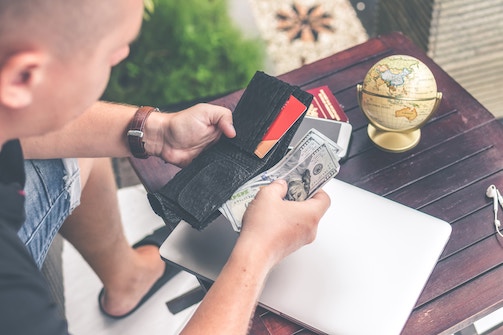When selling your home, you should take your time in qualifying bids. You may get a good number of offers, but which ones are solid? Before putting up your home for sale, you may want to learn more about the Earnest Money Deposit (EMD). This type of payment will protect you from nuisance buyers or those who are not serious about purchasing your property. The Earnest Money Deposit is a payment made by the buyer once the seller of the property has accepted his offer.
The payment is an act of good faith; a sincere gesture that validates the legitimacy of the offer and the desire of the buyer to purchase the property. For this reason, the Earnest Money Deposit is also referred to as a Good Faith Deposit.

4 Things To Know About The Earnest Money Deposit
If a prospective buyer offers to give an EMD, do not immediately agree. Like all agreements, you have to know what you are getting into. It is not simply an act of receiving payment or a deposit for your property. The standard EMD should have qualifying conditions that are agreeable to you. For example, do you know how much you should receive to qualify as an EMD?
Here are 4 things you need to know about before agreeing to an EMD:
When To Propose an EMD as a Buyer
The standard practice in the real estate property market for submitting a proposal for an EMD is within 3 days after the seller has accepted an offer for his property.

However, some buyers are ready to offer an EMD immediately after the seller of the property has agreed to the purchase price.
Minimum Acceptable Amount for an EMD
The amount of the EMD will range from 1% to 3% of the agreed- upon purchase price. For example, if the seller agrees to the offer of $600,000 for his property, the amount of the deposit for the EMD could range from $6,000 to $18,000. If there are a lot of offers for the property, a buyer could move to increase the amount of the deposit to entice the seller to prioritize his offer.
Mode of Payment for a EMD
The standard practice when issuing payment for the EMD is either through wire transfers or cashier’s checks. Should you accept personal checks? If you know the buyer and are confident of his financial history, you may accept a personal check as a form of payment.
Understanding The Status of the EMD?

The amount of the EMD shall remain in full until the sale of the property has been finalized. Depending on the property laws of the seller’s state, the EMD could be held in an Escrow account or deposited in trust to the seller’s attorney. Once the sale is consummated, the amount of the EMD is applied to the buyer’s down-payment for the seller’s property. The EMD will be returned to the buyer if he does not qualify for the Mortgage Contingency Date or if the seller changes his mind and foregoes the sale of his property. However, if it is the buyer who backs out of the agreement and his reason(s) are not covered in the P&S, then the EMD shall be released in full to the account of the seller.
Frequently Asked Questions
Below we answer some of the most frequently asked questions related to earnest money deposits (EMD’s.)
Do You Get Your EMD Earnest Money Deposit Back?
After you’ve found a property that fits your needs, the next step is to determine if it’s worth digging deeper. Typically homeowners are entitled to up 21 days of time for inspections and investigations before deciding whether or not they want to move forward with their purchase. This timeframe ensures there won’t be any costly surprises later on in the process – such as buyer’s remorse after making an emotional decision based solely off pictures online.

Can The Seller Keep The EMD Money?
Sometimes the seller can keep earnest money in certain circumstances. If the buyer backs out of a sale without good reason, or doesn’t hold up to an agreement they made with you—the seller is allowed to take your earnest money as compensation.
Who Gets The Money When The Buyer Backs Out?
When buying a house, there are always unexpected surprises that can cause buyers to back out. In some cases the buyer changes their mind for no apparent reason and in other instances they may have second thoughts when an event outside of real estate makes them anxious. When this happens you need to know how your deposit will be refunded as well as what contingencies might impact it such as expiration date or time frame stipulations on inspections or home repairs prior to sale being finalized. It’s important not only write all these terms into your offer but also work with someone who knows the ins-and-outs of working through contracts so things don’t get messy later down the road!
How Much Earnest Money Should I Put Down On A House?
You may be required to put down earnest money when buying a house. How much you will need to deposit, however, depends on the seller’s agreement or how your lender requires that it is handled in their contract with you. Generally speaking though any amount from 1% up to 2% of the purchase price should suffice for most contracts and escrow accounts but if they specify something else then follow suit accordingly.
What Is Proof Of The Deposit?
A deposit receipt is a tangible reminder of the buyer’s promise to buy. It helps protect both parties in case there are any disputes about whether or not funds were transferred.
A deposit receipt, which can be used as an important piece of evidence if needed! The document proves that you paid your earnest money and guarantees the transaction with its water-tight seal and signature line at bottom.
What Is The Difference Between Option Money And Earnest Money?
The difference between earnest and option money can be summarized by a few key factors. Firstly, the amount of each is different: 1% for earnest while usually 0-5%, or even 10% in some cases, depending on how close to closing time it might be when you make your offer on a property. The payee differs as well; Option Money typically goes to the seller at settlement whereas Earnest Money pays off an item like insurance that was agreed upon before negotiations began with them–a sort of “good faith” gesture from either party should things fall through later down the road. Lastly, they’re not refundable if something falls through post-closing but are only returned (with interest) after everything has been finalized successfully!